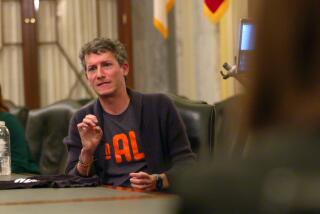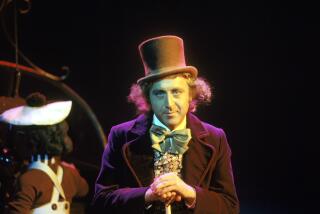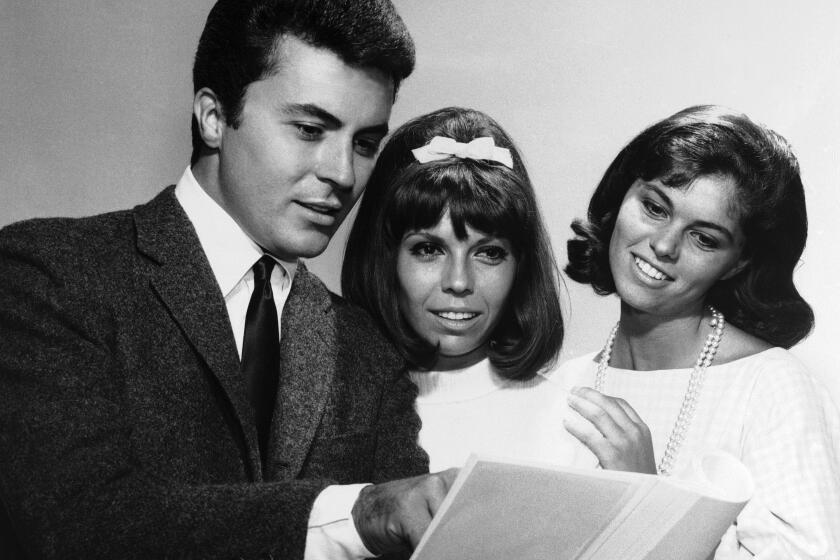Richard Glatzer and Wash Westmoreland on the catharsis of ‘Still Alice’
In December, I conducted an interview with Wash Westmoreland, one of the two directors of “Still Alice,” the movie about early-onset Alzheimer’s that won Julianne Moore an Oscar last month.
Westmoreland’s husband and co-director was Richard Glatzer, who at the time had been waging a grueling battle with ALS; the couple decided to make the movie, in fact, shortly after learning of Glazter’s diagnosis, as they hoped to channel and illuminate their own experiences with a terminal condition. Glatzer was in the room during the phone conversation, listening to both sides via speakerphone, but was not able to speak.
Glatzer passed away Tuesday at 63 after seeing his condition deteriorate rapidly in recent months, representatives announced Wednesday. The sad news came just several weeks after Moore won the Oscar for “Still Alice” and dedicated it to Glatzer, who was watching with Westmoreland from a hospital bed. (Eddie Redmayne, who won his own statuette for playing an ALS sufferer in the Stephen Hawking film “The Theory of Everything,” dedicated his prize to ALS sufferers generally, casting further attention on the illness.)
In light of Glatzer’s passing, we’ve decided to run excerpts of the December interview, none of which was previously published. (The conversation was officially about Moore, whom I was profiling, but quickly branched out.)
At the time of the interview, things looked bleak. Glatzer has lost nearly all movement abilities and communicated by typing on his iPad with one toe. But the couple was still seeking rays of hope. And while that makes some of this admittedly hard to absorb at a time of tragedy, the hope is that people read it as a tribute to Glatzer and a reminder of what “Still Alice” meant to the men who made it.
People in the film world like to toss around the word “brave” a lot. But it’s hard to imagine courage on a greater order than what these men have been through. RIP, Richard Glatzer. You’ll be missed by the many who knew you, and the millions who felt like they did.
Movies Now: This movie has taken a lot of people by surprise -- it came into Toronto on few people’s radar, and left with huge buzz, especially for Julianne. How did you experience it?
Wash Westmoreland: When you’re a filmmaker you live on the promise of these crazy dreams. It may actually be playing better than those dreams. We had a Monday afternoon premiere slot, which is not considered a very good slot. We only finished the movie 10 days before the festival. And now to hear it connect with people the way it has. I’m astonished by the emotional openness of the people who see it. They come up after screenings with tears in their eyes and start telling me about their family, about their lives.
You made this movie in part because of your experience with a devastating illness. Was that a healthy thing to do or just a really hard thing to do?
When we were approached to adapt [Lisa Genova’s] novel, we thought, “this may be a little too close to the bone.” But then we started to feel it was a story we could and should tell. There were just so many ways we understood it. When Richard started exhibiting symptoms in his speech, we made these appointments with neurological specialists and [he was] given the same kind of tests Alice is given in the movie. We had suspected Richard had a stroke, and it turns out it was much worse. And that was what Alice and her family go through -- they think it may not be serious until they realize what it is.
Did it make things easier that ALS and Alzheimer’s are somewhat different? Or does the progressive nature of each erase those distinctions?
There are enormous parallels in terms of the sense of barriers between you and the world. With both ALS and Alzheimer’s you have to constantly struggle to push through, and there are new challenges every day as the disease moves forward, as it changes the way people perceive you. Even small things, like whether they’d invite you to a dinner party. And then there are these people who come through for you in ways you never dream of, and it just shows human beings’ capacity for great things.
What was it like for the two of you to actually be on set in New York making the film last March?
It was physically extremely taxing, very cold, really difficult. Richard lost motor function in his hands literally weeks before the shoot, so there was a lot of adjustment making the movie. But spiritually we felt like we were getting to do something that was so fulfilling that we’d be able to press on.
Indie movies can take a long time to get moving. Did you feel like telling prospective backers, at some points, that it was just so critical to get this made? This it wasn’t just a matter of someone’s work schedule — it was something more serious?
We did hear the clock ticking. That’s why we really wanted to do it in that tiny window Julie had shooting the “Hunger Games” films. Fortunately she was able to work it out [Moore shot “Still Alice” during a break she had arranged on the Atlanta set the franchise of just a few weeks.] A lot of big movies wouldn’t have been as charitable. The true value of the movie is for Richard, for now. We had a few setbacks and then when we were about to complete the movie [in editing] he was hospitalized for a week. It was very touch-and-go.
And then I imagine there was also wanting to get it out quickly .…
Yes, when it came to distributors we had the same feeling. We knew we had a ticking clock there too. We said “we really have to find a distributor who’s going to put it out this year.” Richard might be around and doing fine next year. But this has made us much more aware of the present moment. And so we knew we had to get it out in 2014, knew we had to get it going. And our producers were absolutely kind in getting us that deal, and Sony Classics was great in getting it out in 2014.
Has the reaction out of Toronto validated all that?
I call it hit-movie therapy. So much great stuff about the movie is just buoying us all up. It’s focusing so much on Julie’s beautiful performance and Alzheimer’s awareness and people in difficult circumstances in life. And now we see the trailer — we just saw it tonight — and it’s feeling like lightning is striking. It’s all been a race but sometimes you just have to stop and take stock of how far you’ve come.
I wanted to ask you about the ALS ice-bucket challenge, which has just been such a celebrity fixture the past several months. How do you view it and its approach to finding a cure for ALS?
To us it’s amazing. It’s this frat-boy hazing initiation and now it’s turned into this huge explosion. When we were in the hospital in Brooklyn earlier in the year it started to be everywhere. Then people on the movie started to do it. Julie did it and dedicated it to Richard. Kristen [Stewart, also in the film] did it and dedicated it to Richard. We kept thinking “this is crazy.” We’ve felt like such a minority with all of this, like one in a hundred thousand, and now all of these people are doing this thing for ALS. It just raised our hopes and gave us hope for Richard’s prospects.
I want to thank both of you. There are back stories in this business that are worthy and inspirational but I’m not sure many of them compare to yours.
Thank you for taking an interest. We really do appreciate all the attention the movie gets. Every bit of good notice is validation for what we’ve been going through and makes us feel a little less alone. Wait a minute, Richard has a message. [Pauses] He wanted to say something about Julie. He says she’s fearless and not concerned about her image — it’s just about the truth of her work. So that’s what Richard wants to say. And that’s how I feel too.”
Twitter: @ZeitchikLAT
More to Read
Only good movies
Get the Indie Focus newsletter, Mark Olsen's weekly guide to the world of cinema.
You may occasionally receive promotional content from the Los Angeles Times.









